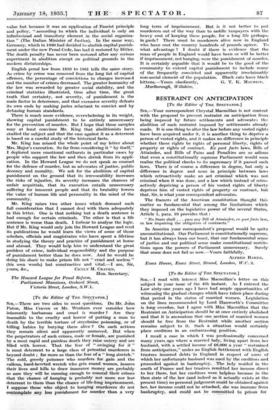RESTRAINT ON ANTICIPATION
[To the Editor of TnE SPECTATOR.] Sin,—Your correspondent Chrystal Macmillan is not content with the proposal to prevent restraint on anticipation from being imposed by future settlements and advocate; the abolition of such restraint imposed by settlements already made. It is one thing to alter the law before any vested rights have been acquired under it, it is another thing to deprive a person of vested rights, and it makes no difference in principle whether those rights be rights of personal liberty, rights of property or rights of contract. Ex post facto laws, Bills of Attainder, and Bills of Pains and Penalties are so *odious that even a constitutionally supreme Parliament would soon realize the political checks to its supremacy if it passed such laws. There is of course a difference in degree, but only a difference in degree and none in principle between laws which retroactively make an act criminal which was not criminal when it was done, and a law which instead of retro- actively depriving a person of his vested rights of liberty deprives him of vested rights of property or contract, but that, Sir, is what your correspondent advocates.
The framers of the American constitution thought this matter so fundamental that among the limitations which they imposed on the legislative power of the several States, Article _1, para. 10 provides that :
" No State shall . . . pass any Bill of Attainder, ex post facto law, or law impairing the obligation of contracts."
In America your correspondent's proposal would be quite unconstitutional. Our Parliament is constitutionally supreme, but it has always been our boast, that our fundamental sense of justice and our political sense make constitutional restric- tions upon the powers of Parliament unnecessary. Surely that sense does not fail us now.—Yours faithfully, ALFRED BARER.






































 Previous page
Previous page